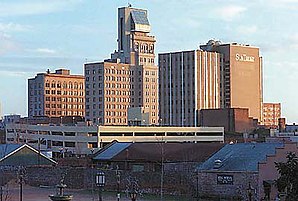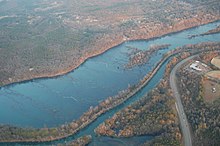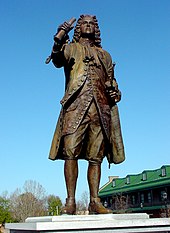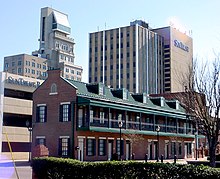Augusta (Georgia)
| Augusta | |
|---|---|
| Nickname : The Garden City (of the South), Masters City, The AUG | |
 Augusta skyline |
|
| Location of the city of Augusta and Richmond County in Georgia | |
| Basic data | |
| Foundation : | 1736 |
| State : | United States |
| State : | Georgia |
| County : | Richmond County |
| Coordinates : | 33 ° 28 ′ N , 81 ° 59 ′ W |
| Time zone : | Eastern ( UTC − 5 / −4 ) |
|
Inhabitants : - Metropolitan Area : |
197,081 (as of 2016) 594,919 (as of 2016) |
| Population density : | 252 inhabitants per km 2 |
| Area : | 793 km 2 (approx. 306 mi 2 ) of which 782 km 2 (approx. 302 mi 2 ) is land |
| Height : | 128 m |
| Postcodes : | 30901-30999 |
| Area code : | +1 706 762 |
| FIPS : | 13-04204 |
| GNIS ID : | 310670 |
| Website : | www.augustaga.gov |
| Mayor : | Hardie Davis, Jr. |
Augusta [ ɑːˈgʌstə ] is a city in the US state of Georgia in the United States of America . With 195,844 inhabitants (2010; urban district) it is the second largest city in Georgia after Atlanta . The city is known for the professional golf tournament The Masters Tournament , one of the four majors that is held here every year by the Augusta National Golf Club on the club's own golf course . In 1996 the city of Augusta merged with Richmond County and formed a consolidated city-county , which has been jointly administered since then. The city is the center of the metropolitan area of Augusta .
geography
Geographical location
Augusta is about 150 miles from Atlanta and also about 150 miles from the Atlantic Ocean on the Georgia- South Carolina border . The city is located on the south bank of the Savannah River , which forms the state border here, which with a series of small waterfalls overcomes the height difference between the hill country to the west and the Atlantic coastal plain near Augusta and is therefore only navigable as far as Augusta, which is the main reason for founding a city was at this point.
Neighboring communities
The northeastern neighbor city of Augusta is the suburb of North Augusta , which lies across the state line in Aiken County in South Carolina. Within Richmound County, the small towns of Hephzibah and Blythe are neighbors of Augusta, who did not participate in the merger to form consolidated city-county and retained independent city councils.
The metropolitan area of Augusta, the Augusta-Aiken Metropolitan Area , had a population of 594,919 people in 2016 , according to an estimate by the United States Census Bureau . It was 93rd in the United States and second in Georgia. The metropolitan area consists of five counties in two US states:
Augusta is also the largest city in the Central Savannah River Area , a regional development area that also includes the cities of Martinez, Louisville , Sandersville , Thomson, and Waynesboro .
history
founding
The place where Augusta is today was first used by North American Indians to cross the Savannah River. In 1735, two years after the English nobleman James Oglethorpe founded the city of Savannah at the mouth of the Savannah River , he sent a contingent of troops upstream. He gave them the task of establishing a settlement at the point at which the river was navigable, a task that fell to Nobel Jones, who in 1736 built the city as a forward defense post against the Spanish and French. Oglethorpe named the city Augusta in honor of Augusta von Sachsen-Gotha , the fiancée of the British heir to the throne Friedrich Ludwig von Hanover .
The city was laid out on the flat embankment of the Savannah River. The townspeople mostly got along peaceably with the neighboring Creek and Cherokee Indians. In 1739 construction began on a road from Savannah to Augusta. Now that the city could also be reached on horseback and not just by boat, more residents settled there. In 1750, St. Paul's was the first church in Augusta to be built. In 1777 Georgia adopted a new constitution and the counties were reorganized. Augusta was assigned to the newly formed Richmond County.
From War of Independence to War of Civil Secession
During the American Revolutionary War , Savannah fell to the British, making Augusta the capital of Georgia and the new preferred destination for the British. On January 31, 1779, the British Lieutenant Colonel Archibald Campbell took the city of Augusta. He soon withdrew, however, as American troops were gathering on the opposite bank of the river. Augusta became the capital of Georgia again , but fell into British hands again before the end of the war.
By the end of the Civil War , Augusta became a leader in the manufacture of textiles , gunpowder and paper thanks to the completion of the Augusta Canal in 1847 . With the completion of the railway Georgia Railroad in 1845 Augusta received a rail connection to Atlanta, then to the Tennessee River in Chattanooga , and ultimately to the Mississippi River . This connection from the Atlantic to the center of the country, which was cheaper than before, led to a considerable increase in trade. In 1860 Augusta had 12,493 inhabitants, making it one of 102 American cities with a population of more than 10,000 and already the second largest city in Georgia.
From Civil War to World War II
Originally the inhabitants of Augusta welcomed the Civil War. In 1861/62 the Confederates built a new gunpowder factory in Augusta. Over 2,000 residents of Augusta fought in the Civil War, but the residents of the city first became aware of the war in the summer of 1863, when thousands of refugees from areas threatened by invasion pushed their way to Augusta, leading to shortages in accommodation and supplies. General Sherman's army also got dangerously close to the city, causing panic on the streets of the once quiet city. However, the city was not burned down.
In 1828 the Medical Academy of Georgia was founded in Augusta and began training doctors. In 1873 the academy became the medical department of the University of Georgia (and later, in 1956, the Medical College of Georgia ). In 1914, the university hospital was founded near the university, which laid the foundation for the city's well-developed medical sector.
Unlike many other cities in the American South, Augusta flourished after the end of the Civil War. By the early 20th century, the city had become one of the world's largest inland cotton markets . A new military establishment, Camp Hancock, was established near Augusta during the First World War .
Before World War II , the US Army built a new barracks nearby, Camp Gordon (later Fort Gordon ), which was completed a few days after the December 7, 1941 attack on Pearl Harbor . Many new recruits were trained here before they were sent to war. A few months after the end of the war, most of the soldiers had returned from the camp, and the important role of the military in Augusta seemed to be over.
The golden age of Augusta
New life came to the city in 1948 when the US Army moved the US Army Signal Corps training and military police school to Camp Gordon. In November 1948, the Clarks Hill Reservoir was created with a newly built dam and supplied the city with electricity from a hydroelectric power station . In the 1950s, the Savannah River Site (now operated by the US Department of Energy ) was built near Augusta, which swelled the city's population by 50,000 and made Augusta an industrial center of the south.
Religions
Augusta is the birthplace of the influential in the US Baptists -Bundes Southern Baptist Convention .
politics
In 1996, the city of Augusta and Richmond County, the administrative seat of which was Augusta, merged and formed a new consolidated city-county (about: combined city district), the Augusta-Richmond County . The joint leadership consists of a mayor and 10 commissioners (commission members). In 2004 the administration employed around 2,600 people.
Politics in Augusta is often determined by racial antagonism, which, for example, has a decisive influence on many voting results in the city council. Corruption and crime also play an important role in local politics to this day. In 2005, a Georgia Senate member from Augusta, Charles Walker, was convicted of infidelity and other crimes and removed from office. Around the same time, former Georgia MP from Augusta, Robin Williams, was convicted of fraud.
Town twinning
-
 Takarazuka , Japan , since 1989
Takarazuka , Japan , since 1989 -
 Biarritz , France
Biarritz , France
Culture and sights
Museums
The Augusta Museum of History, founded in 1937, presents the city's history with over 15,000 exhibits.
music
The Augusta Symphony Orchestra was founded in 1954 and today gives classical concerts in 15 surrounding counties.
Buildings
The Confederate Gunpowder Factory, built in 1861/62, was once the second largest gunpowder factory in the world and is the only permanent building erected by the Confederates. The house where Woodrow Wilson lived between the ages of four and fourteen, 1860–1870, can be viewed in Augusta. The Old Medical College is a United States National Historic Landmark .
Parks
Augusta is home to the Georgia Golf Hall of Fame Botanical Garden . The 287 km 2 reservoir Lake Strom Thurmond (Clarks Hill Lake until 1988), which was created by the US Army engineering corps from 1946 to 1954, is one of the most important recreational areas in the southeastern United States.
Sports
The most important sporting event in Augusta is the professional golf tournament The Masters Tournament , one of the four majors , which is held here every year by the Augusta National Golf Club on the club's own golf course . This major event regularly attracts large crowds and is an important source of income for the local hotel and catering industry. The Augusta Green Jackets play baseball at Lake Olmstead Stadium . There are also teams for ice hockey ( Augusta Lynx ), arena football (Augusta Spartans) and soccer (Augusta FireBall).
Economy and Infrastructure
The largest employers in and around Augusta are the Savannah River Site nuclear facility operated by the US Department of Energy , the US Army, which trains radio operators and police officers at Fort Gordon, and the Medical College of Georgia.
traffic
The major interregional roads in Augusta are Interstate 20 from Texas to South Carolina and the Interstate 520 bypass . The rail line through Augusta is served by the Norfolk Southern Railway and CSX Transportation . The Augusta Regional Airport and the smaller Daniel Field are used for air traffic.
media
Augusta's largest daily newspaper is the Augusta Chronicle, which was founded in 1785 as the Augusta Gazette. Various local television and radio stations serve Augusta and the surrounding area, such as WJBF, WRDW, WAGT and WFXG. These broadcasters get essential parts of their programming from the big American broadcasting chains like (in the same order) ABC , CBS , NBC and FOX .
Military facilities
The US Army maintains a base near Augusta, Fort Gordon , where radio operators and military policemen are trained.
education
Augusta is home to the Medical College of Georgia , Georgia Regents University, and Paine College . Before the merger to form the GRU, Augusta State University was also located here .
Personalities
sons and daughters of the town
- Doug Barnard Jr. (1922-2018), politician
- Ben Bernanke (* 1953), Federal Reserve Chairman of the United States
- William R. Boggs (1829-1911), Brigadier General of Confederate in the Civil War
- Archibald Butt (1865-1912), military advisers and victims of the Titanic - Disaster
- James Carpenter (born 1989), American football player
- Alfred Cumming (1829–1910), Brigadier General in the Confederate Army during the Civil War
- Alfred Cumming (1802–1873), politician
- Michael Dease (* 1982), jazz musician and composer
- Laurence Fishburne (born 1961), actor
- Vernon Forrest (1971-2009), professional boxer, WBC super welterweight champion
- Sheldon Goldstein (* 1947), theoretical physicist
- Amy Grant (born 1960), singer
- Harvey Grant (born 1965), NBA basketball player
- Horace Grant (born 1965), NBA basketball player
- James Randal Hall (* 1958), lawyer and politician
- Hulk Hogan (born 1953), wrestler, actor, reality TV participant and musician
- Charles Howell III (* 1979), professional golfer
- Beau Jack (1921-2000), boxer
- Jasper Johns (born 1930), artist
- Kenyon Jones (1977-2005), basketball player
- Sharon Jones (1956-2016), soul and funk singer
- Josh Kelley (born 1980), singer and songwriter
- Augustus Baldwin Longstreet (1790–1870), lawyer, publicist and writer
- Kathryn McCormick (* 1990), dancer and actress
- Alexander McKinstry (1822–1879), politician and Lieutenant Governor of Alabama
- Lafayette McLaws (1821–1897), officer in the US Army and General in the Confederate Army in the American Civil War
- Jessye Norman (1945–2019), opera singer
- Danielle Panabaker (born 1987), actress
- Khary Payton (* 1972), actor and voice actor
- Faith Prince (born 1957), actress and singer
- Carl Sanders (1925–2014), politician and former governor of Georgia
- Susan Leigh Still-Kilrain (* 1961), astronaut
- Walt Weiskopf (* 1959), jazz musician
- Joseph Wheeler (1836–1906), US Army general in the Spanish-American War
- Jennie Wilde (1865–1913), artist
- Frank Yerby (1916–1991), writer
Personalities who have worked on site
- James Brown (1933–2006), famous musician∞ was born near Augusta and grew up in Augusta
- Casper (Benjamin Griffey) (* 1982), German rapper; grew up in Augusta
- Terri Gibbs (born 1954), country singer; grew up in Augusta
- Pastor Troy (born 1977), rapper; grew up in Augusta
- Woodrow Wilson (1856-1924), 28th US President; grew up in Augusta
Others
Erskine Caldwell wrote a novel in 1932, The Tobacco Road (OT: Tobacco Road ), set in rural Richmond County. Tobacco Road actually exists, today it connects the Fort Gordon barracks with the Augusta Regional Airport, but has little in common with the rural area described in the novel.
Web links
- www.augustaga.org Augusta Metropolitan Convention and Visitors Bureau (tourism organization) (in English)
- chronicle.augusta.com Daily newspaper Augusta Chronicle (in English)
- Article by CNN.com about local politics in Augusta (in English) ( Memento of 11 April 2008 at the Internet Archive )








